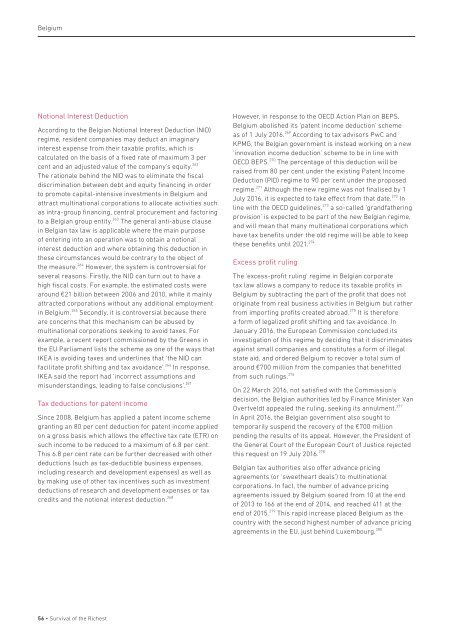You also want an ePaper? Increase the reach of your titles
YUMPU automatically turns print PDFs into web optimized ePapers that Google loves.
Belgium<br />
Notional Interest Deduction<br />
According to <strong>the</strong> Belgian Notional Interest Deduction (NID)<br />
regime, resident companies may deduct an imaginary<br />
interest expense from <strong>the</strong>ir taxable pr<strong>of</strong>its, which is<br />
calculated on <strong>the</strong> basis <strong>of</strong> a fixed rate <strong>of</strong> maximum 3 per<br />
cent and an adjusted value <strong>of</strong> <strong>the</strong> company’s equity. 262<br />
The rationale behind <strong>the</strong> NID was to eliminate <strong>the</strong> fiscal<br />
discrimination between debt and equity financing in order<br />
to promote capital-intensive investments in Belgium and<br />
attract multinational corporations to allocate activities such<br />
as intra-group financing, central procurement and factoring<br />
to a Belgian group entity. 263 The general anti-abuse clause<br />
in Belgian tax law is applicable where <strong>the</strong> main purpose<br />
<strong>of</strong> entering into an operation was to obtain a notional<br />
interest deduction and where obtaining this deduction in<br />
<strong>the</strong>se circumstances would be contrary to <strong>the</strong> object <strong>of</strong><br />
<strong>the</strong> measure. 264 However, <strong>the</strong> system is controversial for<br />
several reasons. Firstly, <strong>the</strong> NID can turn out to have a<br />
high fiscal costs. For example, <strong>the</strong> estimated costs were<br />
around €21 billion between 2006 and 2010, while it mainly<br />
attracted corporations without any additional employment<br />
in Belgium. 265 Secondly, it is controversial because <strong>the</strong>re<br />
are concerns that this mechanism can be abused by<br />
multinational corporations seeking to avoid taxes. For<br />
example, a recent report commissioned by <strong>the</strong> Greens in<br />
<strong>the</strong> EU Parliament lists <strong>the</strong> scheme as one <strong>of</strong> <strong>the</strong> ways that<br />
IKEA is avoiding taxes and underlines that ‘<strong>the</strong> NID can<br />
facilitate pr<strong>of</strong>it shifting and tax avoidance’. 266 In response,<br />
IKEA said <strong>the</strong> report had ‘incorrect assumptions and<br />
misunderstandings, leading to false conclusions’. 267<br />
Tax deductions for patent income<br />
Since 2008, Belgium has applied a patent income scheme<br />
granting an 80 per cent deduction for patent income applied<br />
on a gross basis which allows <strong>the</strong> effective tax rate (ETR) on<br />
such income to be reduced to a maximum <strong>of</strong> 6.8 per cent.<br />
This 6.8 per cent rate can be fur<strong>the</strong>r decreased with o<strong>the</strong>r<br />
deductions (such as tax-deductible business expenses,<br />
including research and development expenses) as well as<br />
by making use <strong>of</strong> o<strong>the</strong>r tax incentives such as investment<br />
deductions <strong>of</strong> research and development expenses or tax<br />
credits and <strong>the</strong> notional interest deduction. 268<br />
However, in response to <strong>the</strong> OECD Action Plan on BEPS,<br />
Belgium abolished its ‘patent income deduction’ scheme<br />
as <strong>of</strong> 1 July 2016. 269 According to tax advisors PwC and<br />
KPMG, <strong>the</strong> Belgian government is instead working on a new<br />
‘innovation income deduction’ scheme to be in line with<br />
OECD BEPS. 270 The percentage <strong>of</strong> this deduction will be<br />
raised from 80 per cent under <strong>the</strong> existing Patent Income<br />
Deduction (PID) regime to 90 per cent under <strong>the</strong> proposed<br />
regime. 271 Although <strong>the</strong> new regime was not finalised by 1<br />
July 2016, it is expected to take effect from that date. 272 In<br />
line with <strong>the</strong> OECD guidelines, 273 a so-called ‘grandfa<strong>the</strong>ring<br />
provision’ is expected to be part <strong>of</strong> <strong>the</strong> new Belgian regime,<br />
and will mean that many multinational corporations which<br />
have tax benefits under <strong>the</strong> old regime will be able to keep<br />
<strong>the</strong>se benefits until 2021. 274<br />
Excess pr<strong>of</strong>it ruling<br />
The 'excess-pr<strong>of</strong>it ruling' regime in Belgian corporate<br />
tax law allows a company to reduce its taxable pr<strong>of</strong>its in<br />
Belgium by subtracting <strong>the</strong> part <strong>of</strong> <strong>the</strong> pr<strong>of</strong>it that does not<br />
originate from real business activities in Belgium but ra<strong>the</strong>r<br />
from importing pr<strong>of</strong>its created abroad. 275 It is <strong>the</strong>refore<br />
a form <strong>of</strong> legalized pr<strong>of</strong>it shifting and tax avoidance. In<br />
January 2016, <strong>the</strong> European Commission concluded its<br />
investigation <strong>of</strong> this regime by deciding that it discriminates<br />
against small companies and constitutes a form <strong>of</strong> illegal<br />
state aid, and ordered Belgium to recover a total sum <strong>of</strong><br />
around €700 million from <strong>the</strong> companies that benefitted<br />
from such rulings. 276<br />
On 22 March 2016, not satisfied with <strong>the</strong> Commission’s<br />
decision, <strong>the</strong> Belgian authorities led by Finance Minister Van<br />
Overtveldt appealed <strong>the</strong> ruling, seeking its annulment. 277<br />
In April 2016, <strong>the</strong> Belgian government also sought to<br />
temporarily suspend <strong>the</strong> recovery <strong>of</strong> <strong>the</strong> €700 million<br />
pending <strong>the</strong> results <strong>of</strong> its appeal. However, <strong>the</strong> President <strong>of</strong><br />
<strong>the</strong> General Court <strong>of</strong> <strong>the</strong> European Court <strong>of</strong> Justice rejected<br />
this request on 19 July 2016. 278<br />
Belgian tax authorities also <strong>of</strong>fer advance pricing<br />
agreements (or ‘swee<strong>the</strong>art deals’) to multinational<br />
corporations. In fact, <strong>the</strong> number <strong>of</strong> advance pricing<br />
agreements issued by Belgium soared from 10 at <strong>the</strong> end<br />
<strong>of</strong> 2013 to 166 at <strong>the</strong> end <strong>of</strong> 2014, and reached 411 at <strong>the</strong><br />
end <strong>of</strong> 2015. 279 This rapid increase placed Belgium as <strong>the</strong><br />
country with <strong>the</strong> second highest number <strong>of</strong> advance pricing<br />
agreements in <strong>the</strong> EU, just behind Luxembourg. 280<br />
56 • <strong>Survival</strong> <strong>of</strong> <strong>the</strong> <strong>Richest</strong>


